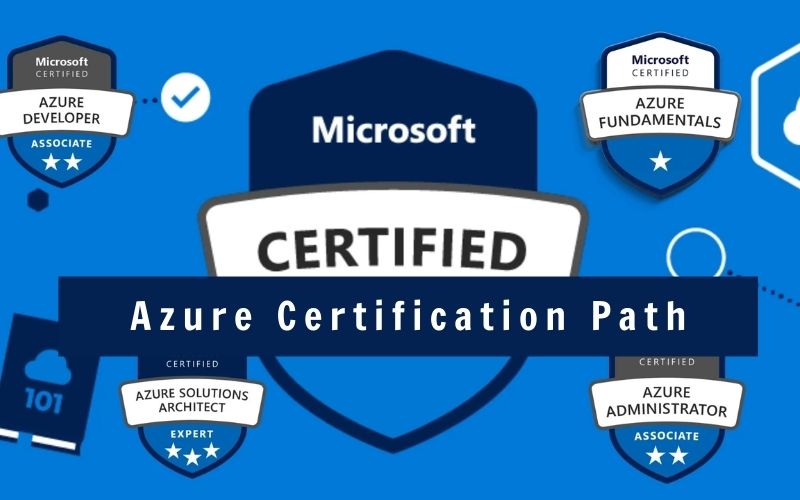Are you thinking about going into cybersecurity as a career? Do you wish to get the expertise and knowledge required to work in cybersecurity? If so, getting a certification in cyber security might be a wonderful place to start. The need for cybersecurity experts is growing rapidly in today’s digital environment, where cyber dangers are continually rising. Obtaining a cyber security certification can help you stand out in the crowded job market and improve your work chances.
IT Exams Training will examine the top 10 best cyber security certifications in this post to assist you advance your career in the online world. We will go through the various certificates, their advantages, and the skills they teach.
Why Cyber Security Certifications are Important

Certifications in cyber security are a crucial tool for anybody looking to pursue a career in the field. They certify your expertise in a variety of cyber security fields, from network security to ethical hacking. These credentials show potential employers that you have the know-how to address problems with cyber security and successfully reduce cyber risks.
A organized learning route that includes crucial cyber security subjects is another benefit of certifications. They provide you with the most up-to-date, standard strategies and tools for protecting digital assets and fending off cyberattacks. Additionally, certifications provide you an advantage over uncertified applicants and increase your reputation as a cybersecurity specialist.
Types of Cybersecurity Certifications
Entry-Level Certifications
Entry-level cyber security certifications are created for those who are brand-new to the industry and are looking to establish a solid understanding of the subject. The subjects covered by these certificates frequently include risk management, network security, and fundamental security concepts. CompTIA Security+, Cisco CCNA Security, and GIAC Security Essentials are a few well-known entry-level credentials.
Intermediate Certifications
Professionals looking to further their knowledge and abilities and have some experience in the industry can consider obtaining an intermediate cyber security certification. More complex subjects like ethical hacking, penetration testing, and incident response are frequently included by these certificates. The Certified Ethical Hacker (CEH), CompTIA Cybersecurity Analyst (CySA+), and GIAC Certified Incident Handler (GCIH) are a few well-known intermediate qualifications.
Advanced Certifications
For seasoned experts looking to prove expertise in a specific area of cyber security, advanced certifications are available. Advanced subjects like digital forensics, security architecture, and governance are covered by these certificates, which sometimes call for a great deal of prior expertise in the industry. GIAC Certified Forensic Analyst (GCFA), Certified Information Security Manager (CISM), and Certified Information Systems Security Professional (CISSP) are a few examples of well-known advanced certificates.
Best Cyber Security Certifications

1. Certified Ethical Hacker (CEH)
Do you take hacking seriously? Have you seen “Swordfish” and thought, “Wow. I desire to resemble Stanley Jobson. Consider a career in ethical hacking after that. As businesses stress-test their infrastructure to prevent significant hacking risks, you’ll get paid to hack into systems to find vulnerabilities.
This credential is well-liked in industries including the military, software, manufacturing, and telecommunications. The certification is offered by the International Council of E-Commerce Consultants. The training guarantees that students possess knowledge and abilities in five crucial areas: concealing tracks, preserving access, enumeration, acquiring access, and reconnaissance.
Ethical hackers can work in fields needing expertise with:
- Honeypots (systems that attract and deflect attacks)
- Firewalls
- Evading IDS
- Penetration testing
- Cryptography
- SQL injection
- Hacking web servers
- Session hijacking
- Social engineering
- Denial of service attacks
- Sniffers
- Viruses
- Worms
- Trojans
- System hacking
- Enumeration
To pass the test, you must have proper instructions. The CEH certificate test is somewhat harder than the CompTIA Security+ exam, but it’s still doable.
Examining networks. Due to the field’s ongoing evolution, the CEH certificate must be renewed every three years, exactly like the CompTIA Security+.
2. CompTIA Security+
You should strive to pass CompTIA Security+ initially because it is often regarded as the standard for introductory network security certifications.
Since it is well-known in the industry, the majority of professionals use it as a starting point. By holding this certification, you may show potential employers that you are educated about a range of cybersecurity subjects, have a thorough grasp of the industry, and have the technical skills required to be successful in a range of roles.
Think of the Network+ certification course as a prerequisite to passing this test. You could also consider enrolling in the CCNA program. CCNA training covers a lot more crucial subjects than Network+ teaching, albeit being slightly more demanding.
Yet more thing to consider In order to obtain the CompTIA Security+ certification, just one test must be passed. Every three years, you must renew your certification in order to keep current with current practices. It could seem like a small period to some experts. However, because the development of digital infrastructure is moving so swiftly, cybersecurity must also keep up.
Candidates may pursue careers in identity management, cryptography, threat management, security systems, security risk assessment, network access control, and security infrastructure after earning their certifications.
In addition, additional, more challenging cybersecurity courses include this course as a prerequisite. Spend the time required to check something off the list. You can progress to cybersecurity classes that are harder and more narrowly focused.

3. Computer Hacking Forensic Investigator
Given the rise in cybersecurity, the need for effective computer investigative techniques is more important than ever. A practical introduction to the criminal justice system is made possible for professionals by the Computer Hacking Forensic Investigator certification. It’s perfect for researching criminal information. The results of our study may be useful to the police or the attorneys handling certain cases.
Information security professionals that work with forensic data must understand how to locate information and categorize it for later retrieval. The Computer Hacking Forensic Investigator certification is for those who are looking for a hands-on education. Businesses are interested because this certification has useful applications.
There are 150 questions on the test, and it takes four hours to finish. The passing mark on the multiple-choice exam ranges from 60 to 85%. As you study for the exam, you will learn about topics including stealing trade secrets, fraud, destroying intellectual property, and more.
There will be an increase in computer crime as more systems go online and become digital. Therefore, obtaining a Computer Hacking Forensic Investigator certification would be helpful even after receiving a passing grade.
4. CISA: Certified Information Systems Auditor
Do you want to work in assurance and control roles in audits? Then CISA is the de facto industry standard certification that will further your information systems profession. If you pass the CISA exam, you may advise companies on how to set up their data systems.
You’ll also be an expert in asset protection, development, maintenance and service management, audits, and governance acquisition. Having experience in these areas is very useful for an information system professional and will open up several work opportunities.
You will need to take a single test that consists of 150 multiple-choice questions. You must complete 120 credits of continuing professional education over a three-year period in order to maintain your certification. Over 90 CISA courses are available to help you get a passing grade. To choose which training program would best meet your goals, look over a couple of these courses.
5. CISM: Certified Information Security Manager
Professionals with CISM certification might find work supervising, creating, and administering information security systems. Since the certification program’s inception in 2002, more than 30,000 candidates have passed the exam and earned the title of Certified Information Security Manager.
Completing the CISM course materials successfully demonstrates that you possess the technical knowledge necessary to comprehend how to set up security systems in a way that is appropriate for their intended usage. IT professionals who have at least two years of experience in the industry and wish to advance their expertise are the ideal candidates for the course.
Additionally, IT professionals who desire to pursue more specialized cybersecurity employment should acquire CISM certification. For instance, if you want to work as a security systems manager in the future, you must complete this course. Employers recognize the technical proficiency demonstrated by taking the CISM course.
Read more >> Top 5 Best Networking Certifications for Beginners In 2023
Benefits of Cyber Security Certifications
Beyond the obvious huge cash benefit, completing a Cyber Security course offers a number of benefits. Let’s now look at a couple of those benefits.
Certifications Make You Stand Out

Your certifications might make you stand out from other job seekers. Rarely will a candidate who is similarly qualified but uncertified outperform a candidate who has a certification or many certifications simply because of the certification. The certification acts as the deciding element for the employer in certain circumstances. The pursuit of certificates gives college students a competitive advantage over those who have graduated from college, thus I always urge them to do so.
This certification can help students who want to enroll in prominent colleges for further education since they improve your resume.
Certifications are highly valued by employers
Even if not all companies are persuaded by certifications, there are still a lot of firms that find them impressive. Additionally, the Department of Defense establishes minimal educational standards for its workers, such as the CompTIA Security+ for a variety of security and intelligence professions. Obtaining a certificate might also make you stand out to companies, who could in some situations value it more than a college graduation.
This is mostly because earning a college degree is so comprehensive and all-encompassing. A cybersecurity certification, on the other hand, demonstrates that you have in-depth understanding of the ideas and techniques that are effective in deterring cybercrime.
A certification demonstrates dedication
Everyone is aware of the effort needed to obtain a certification, thus having one does demonstrate a degree of commitment to your field of work and knowledge. This is especially important given that you are just starting your career and have fewer tools available to you and fewer subjects to cover with potential employers. Your dedication to your field of work is demonstrated by your certification.
Additionally, if you’re new to the field, this is quite beneficial. As a consequence, you’ll become more credible, making it easier for businesses to hire you. Simply put, obtaining a certification shows your dedication to the industry and desire to have a fruitful, protracted career.
Certification is given more respect
There are several available offline and online training programs, and a startling number of individuals have spent thousands of dollars on them. The bulk of these educational initiatives are brain dumps or paper mills, where students are typically denied the opportunity to try learning something for themselves and are given little time to truly learn anything. The challenge is that many of these training programs are tied to certification preparation, even if many of the students ultimately fail the exam. Employers typically see certification as more of a confirmation of expertise than simply having taken some training.
Certification could be used for negotiations.
Financial considerations must ultimately factor into every job selection, and here they are. Certifications might help a cybersecurity expert acquire leverage when negotiating a raise or promotion. This explains why so many accredited businesses try to associate payments with their qualifications. It may be useful to try to use a certification as a negotiation weapon, however the chance that it will lead to a raise for you relies on a number of other factors.
How to Choose the Right Cybersecurity Certification

Unfortunately, there is already a very broad list of cyber security certificates available, which may make it quite difficult to decide which one to pick. If two qualifications on paper seem to be quite similar in nature, making this choice might once again look incredibly difficult. For individuals wishing to begin a career as a penetration tester, this is obvious. While CompTIA and GIAC both provide penetration testing certificates (PenTest+ and GPEN), the EC-Council offers many certifications (ECSA and LPT). There is no clear answer as to which course of action is preferable in such circumstances.
Conducting your own study and exercising due diligence is the only way to determine which cyber security certification is suitable for you. You can consider some factors like your career goals, level of experience, industry requirements ( for example, the Payment Card Industry Data Security Standard (PCI DSS) requires organizations that handle credit card data to have certified professionals on their staff.), and so on. Examine all the organizations that provide the kinds of cyber security certifications you’re interested in, then select the best fit. Obtaining various qualifications is also beneficial. When making their final choice, employers will always search for the person who is the most qualified for the position.
FAQs

What is the most valuable cyber security certification?
Information systems security specialist (CISSP) certified The cybersecurity professional organization (ISC)2’s CISSP certification is one of the most sought-after qualifications in the field.
Can I obtain a cyber security certification without any experience?
To be eligible for a junior cybersecurity entry-level position, prior experience in the industry is helpful but not necessary. We have students who began with no prior IT knowledge and went on to obtain high-paying cybersecurity jobs. It’s not necessary to have a degree in IT or cybersecurity either.
How much do certified cybersecurity professionals earn?
The pay gap between qualified and non-certified cybersecurity workers is frequently wide. Depending on the qualification, amount of experience, and place of employment, the typical annual income for a qualified professional might range from $75,000 to $150,000. With an average compensation of almost $120,000 annually, the CISSP certification is one of the highest-paying qualifications.
How often do I need to renew my certification?
The majority of cyber security certificates need to be renewed every couple of years, usually every two to three. As a result, qualified personnel are kept abreast of the most recent developments in technology and trend. Continual education requirements or passing a renewal exam may be part of the renewal process, depending on the certification.
Conclusion
You can see that there are several cybersecurity certifications available that may help you progress your career and show that you are knowledgeable in a certain area of cyber security. Selecting the certification that best suits your interests and professional objectives is crucial, though.
Think about things like the degree of skill necessary, the topics covered, and the certification’s standing in the industry when selecting a cyber security certification. Moreover, keep your certification current by enrolling in continuing education classes and keeping up with the most recent cybersecurity developments and risks.
The best cyber security certifications can help you advance your career and show that you are an expert in a certain branch of cyber security. Think about the certificates mentioned in this article, then pick the one that most closely matches your hobbies and professional objectives.
[Sassy_Social_Share]


